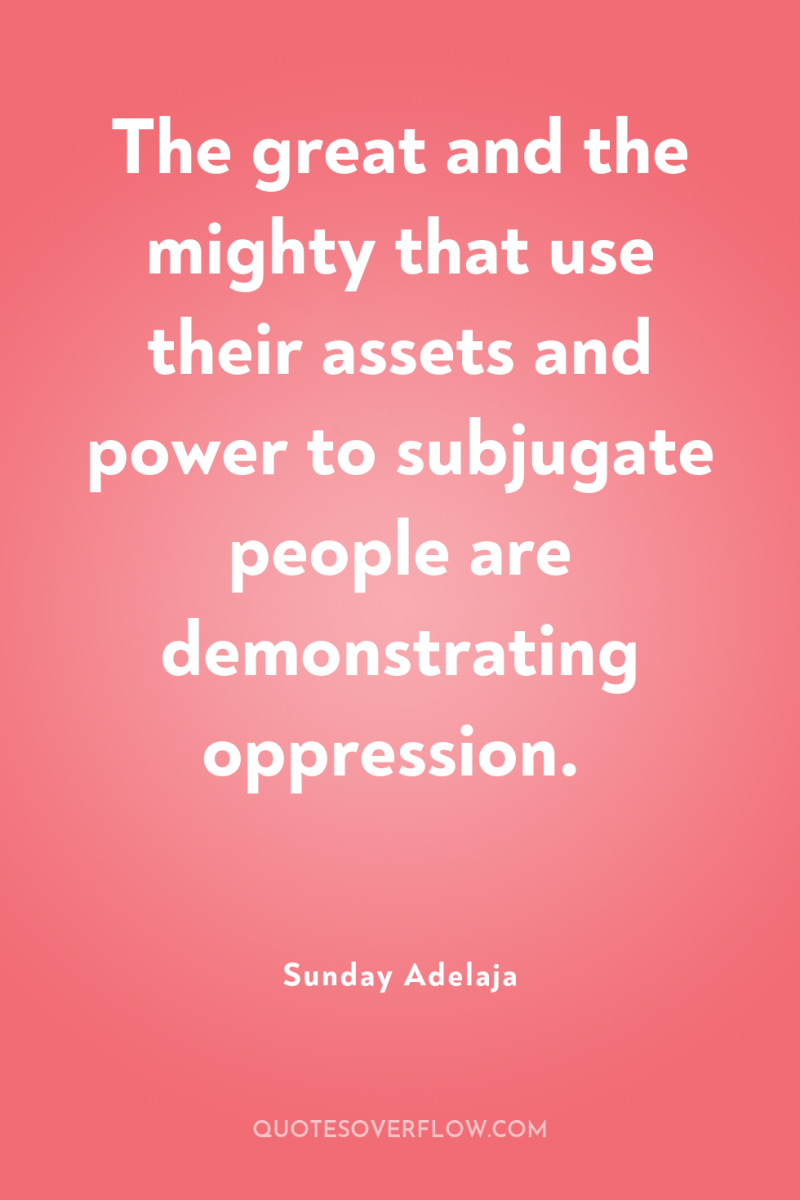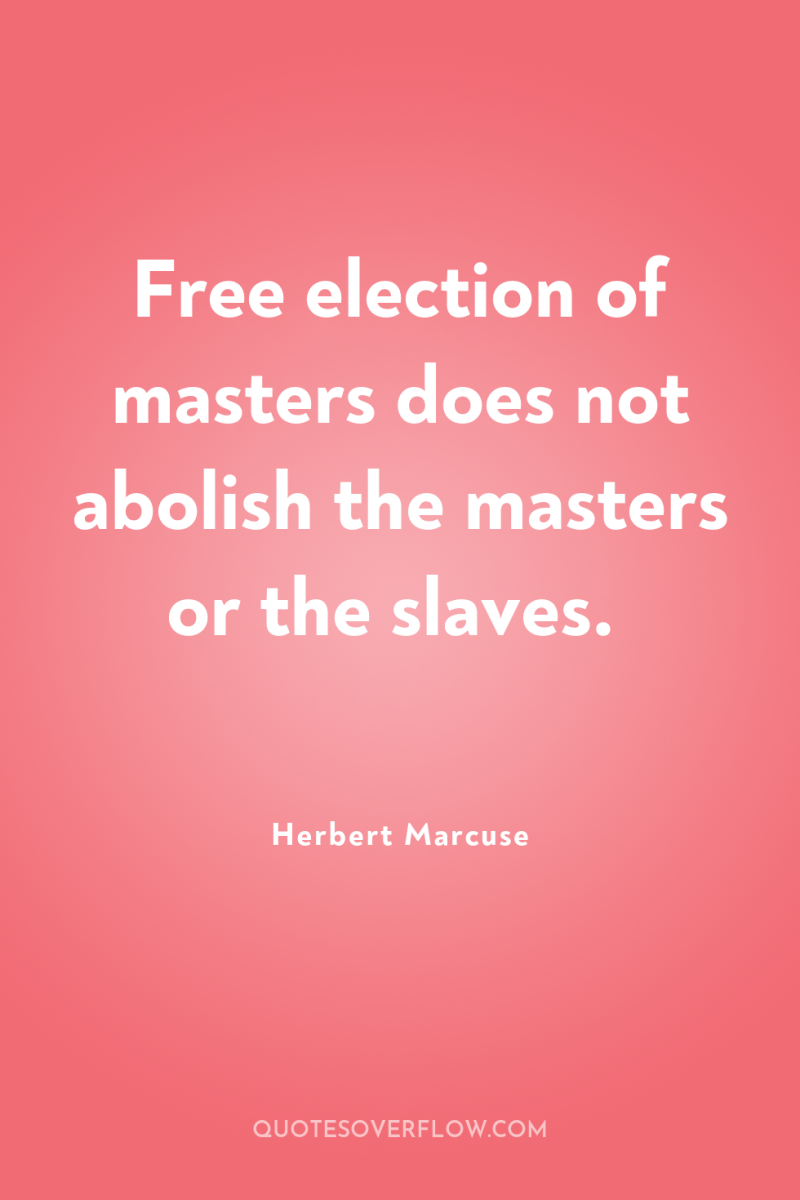
1
The great and the mighty that use their assets and power to subjugate people are demonstrating oppression.Sunday Adelaja

2
Free election of masters does not abolish the masters or the slaves.Herbert Marcuse
3
It really is something .. that men disapprove even of our doing things that are patently good. Wouldn't it be possible for us just to banish these men from our lives, and escape their carping and jeering once and for all? Couldn't we live without them? Couldn't we earn our living and manage our affairs without help from them? Come on, let's wake up, and claim back our freedom, and the honour and dignity that they have usurped from us for so long. Do you think that if we really put our minds to it, we would be lacking the courage to defend ourselves, the strength to fend for ourselves, or the talents to earn our own living? Let's take our courage into our hands and do it, and then we can leave it up to them to mend their ways as much as they can: we shan't really care what the outcome is, just as long as we are no longer subjugated to them. .Moderata Fonte
4
The truth is, one who seeks to achieve freedom by petitioning those in power to give it to him has already failed, regardless of the response. To beg for the blessing of “authority” is to accept that the choice is the master’s alone to make, which means that the person is already, by definition, a slave.Larken Rose
5
Government as we now know it in the USA and other economically advanced countries is so manifestly horrifying, so corrupt, counterproductive, and outright vicious, that one might well wonder how it continues to enjoy so much popular legitimacy and to be perceived so widely as not only tolerable but indispensable. The answer, in overwhelming part, may be reduced to a two-part formula: bribes and bamboozlement (classically "bread and circuses"). Under the former rubric falls the vast array of government "benefits" and goodies of all sorts, from corporate subsidies and privileges to professional grants and contracts to welfare payments and health care for low-income people and other members of the lumpenproletariat. Under the latter rubric fall such measures as the government schools, the government's lapdog news media, and the government's collaboration with the producers of professional sporting events and Hollywood films. Seen as a semi-integrated whole, these measures give current governments a strong hold on the public's allegiance and instill in the masses and the elites alike a deep fear of anything that seriously threatens the status quo.Robert Higgs
6
[In 16th century European society] Marriage was the triumphal arch through which women, almost without exception, had to pass in order to reach the public eye. And after marriage followed, in theory, the total self-abnegation of the woman.Antonia Fraser
7
This pre-eminence is something [men] have unjustly arrogated to themselves. And when it's said that women must be subject to men, the phrase should be understood in the same sense as when we say we are subject to natural disasters, diseases, and all the other accidents of this life: it's not a case of being subjected in the sense of obeying, but rather of suffering an imposition, not a case of serving them fearfully, but rather of tolerating them in a spirit of Christian charity, since they have been given to us by God as a spiritual trial.Moderata Fonte
8
Communism deprives no man of the power to appropriate the products of society: all that it does is to deprive him of the power to subjugate the labor of others by means of such appropriation. It has been objected, that upon the abolition of private property all work will cease, and universal laziness will overtake us. According to this, bourgeois society ought long ago to have gone to the dogs through sheer idleness; for those of its members who work, acquire nothing, and those who acquire anything, do not work.Karl Marx
9
Government today is growing too strong to be safe. There are no longer any citizens in the world there are only subjects. They work day in and day out for their masters they are bound to die for their masters at call. Out of this working and dying they tend to get less and less.H.l. Mencken
10
Putting on the collar is taking charge of unexpected situations. Keeping humans from taking control from me. To tell hunters that I'm not prey. Not a trophy by wearing the collar. I looked at the circlet again. Looking deeper, I see not subjugation, but a tool of power to control my fate in the world of man that symbolizes my ownership over both my nature spirit and wolf-self.Jazz Feylynn
11
Looking deeper, I see not subjugation, but a tool of power to control my fate in the world of man that symbolizes my ownership over both my nature spirit and wolf-self.Jazz Feylynn
12
We enjoy talking about music, politics, and subjugation. –Kinky Friedman to Night Rider on KOKE-FMRay Palla
13
Do as you must -- you are not a child. But understand that there are many people willing to make your life more difficult. It is up to you to find a way to make things easier for yourself.Nadia Hashimi
14
Every exercise of power incorporates a faint, almost imperceptible, element of contempt for those over whom the power is exercised. One can only dominate another human soul if one knows, understands, and with the utmost tact despises the person one is subjugating.Unknown
15
Another basic characteristic of liberalism which constitutes a formidable obstacle to an oppressed group's liberation is its conception of human nature. If selfishness, aggressiveness, the drive to conquer and dominate, really are among defining human traits, as every liberal philosopher since Locke tries to convince us, the oppression in civil society–i.e. in the social sphere not regulated by the state–is a fact of life, and the basic civil relationship between a man and a women will always remain a battlefield. Woman, being less aggressive, is then either the less human of the two and doomed to subjugation, or else she must get more power-hungry herself and try to dominate man. Liberation for both is not feasible.Mihailo Markovic
16
Subjugation requires vigilance; if you relax your brutality even for a moment, the people you're oppressing will revolt at the first sign of weakness. That's why dictatorial regimes are always a slippery slope of cruelty doomed to end in failure.Nenia Campbell
17
At my glummest, I sometimes think women get to chose- between being punished for being unsubjugated and the continual punishment of subjugation.Rebecca Solnit
18
When female stories are muted, we are teaching our kids that their dignity is second class and the historical accounts of their lives [are] less relevant. This lowered value carries over when women face sexual objectification and systemic brutalization from inside and outside the community.Aurin Squire
19
There is no difference between the principles, policies and practical results of socialism–and those of any historical or prehistorical tyranny. Socialism is merely democratic absolute monarchy–that is, a system of absolutism without a fixed head, open to seizure of power by all corners, by any ruthless climber, opportunist, adventurer, demagogue or thug.Ayn Rand
20
Above all, it seems to me wrongheaded and dangerous to invoke historical assumptions about environmental practices of native peoples in order to justify treating them fairly.. By invoking this assumption [i.e., that they were/are better environmental stewards than other peoples or parts of contemporary society] to justify fair treatment of native peoples, we imply that it would be OK to mistreat them if that assumption could be refuted. In fact, the case against mistreating them isn't based on any historical assumption about their environmental practices: it's based on a moral principle, namely, that it is morally wrong for one people to dispossess, subjugate or exterminate another people.Jared Diamond
21
The instant that any government obtains a monetary printing press, it becomes a deeply dishonest government, empowered to rob people by stealth. A government with the power to print money knows no limits.Jeffrey Tucker
22
People are more willing to support the exercise of authority over themselves when they believe it to be an objective, neutral feature of the natural world. This was the idea behind the concept of the divine right of kings. By making the king appear to be an integral part of God's plan for the world rather than an ordinary human being dominating his fellows by brute force, the public could be more easily persuaded to bow to his authority. However, when the doctrine of divine right became discredited, a replacement was needed to ensure that the public did not view political authority as merely the exercise of naked power. That replacement is the concept of the rule of law.John Hasnas
23
The necessity, then, of those “lesser breeds without the law”–those wogs, barbarians, niggers–is this: one must not become more free, not become more base than they: must not be used as they are used, nor yet use them as their abandonment allows one to use them: therefore, they must be civilized. But, when they are civilized, they may simply “spuriously imitate [the civilizer] back again, ” leaving the civilizer with no satisfaction on which to rest.Unknown
24
A nation will never be vanished by subjugation or oppression, unless they get used to.M.F. Moonzajer
25
It is also the irrational instinct of religionism, the vague yearning for something to worship–a reflection or shadow of the true devotional principle–which prompts men to project a subjective image of the lower, personal mind, and to endow it with human attributes, and then to claim to receive "revelations" from it; and this–the image of the Beast, or unspiritual mind, –is their anthropomorphic God, a fabulous monster the worship of which has ever prompted men to fanaticism and persecution, and has inflicted untold misery and dread upon the masses of mankind, as well as physical torture and death in hideous forms upon the many martyrs who have refused to bend the knee to this Gorgonean phantom of the beast-mind of man. Truly, where the worshipers of this image of the Beast predominate, the man whose brow and hand are unbranded by this superstition, who neither thinks nor acts in accordance with it, suffers ostracism if not virulent persecution.James Morgan Pryse